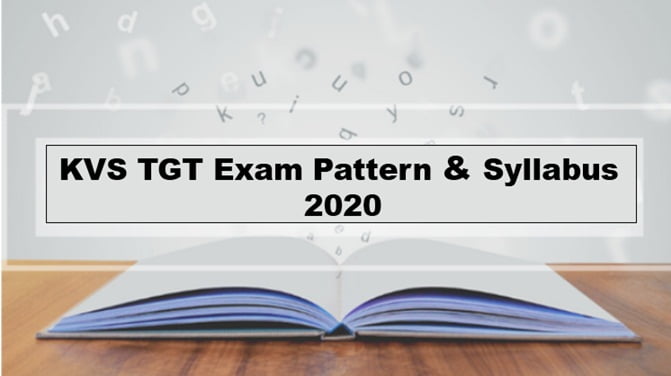KVS TGT Syllabus 2020 PDF Download: केंद्रीय विद्यालय संगठन (KVS) के द्वारा प्राइमरी टीचर(PRS), पोस्ट ग्रेजुएट टीचर (PGTs), प्रशिक्षित ग्रेजुएट टीचर (TGTs) पोस्ट के लिए आवेदन आमंत्रित किए हैं। जिस भी उम्मीदवार ने इसके लिए आवेदन किया है। उन सभी के लिए केंद्रीय विद्यालय संगठन के द्वारा इस परीक्षा का सिलेबस आधिकारिक वेबसाइट पर जारी कर दिया गया है। इस आर्टिकल में हम आपके साथ KVS TGT 2020 विस्तृत सिलेबस तथा परीक्षा पैटर्न साझा कर रहे हैं, जो कि उम्मीदवार को उनकी परीक्षा की तैयारी करने में मदद करेगा।
KVS TGT Exam Pattern & Syllabus 2020
|
Test |
Subjects |
Number of Question |
Total Marks |
Time |
|
Part – I |
General Hindi |
10 |
10 |
2 Hours 30 minutes |
|
General English |
10 |
10 |
||
|
Part – II |
General Knowledge & Current Affairs |
40 |
40 |
|
|
Reasoning Ability |
40 |
40 |
||
|
Computer Literacy |
10 |
10 |
||
|
Pedagogy |
40 |
40 |
||
|
Total |
150 |
150 |
||
KVS TGT Exam Pattern 2020
- KVS के लिए TGT परीक्षा को 2 भागों में विभाजित किया जाएगा।
- भाग I में अंग्रेजी (15) और हिंदी (15) में 30 बहुविकल्पीय प्रश्न होंगे, जिनमें से प्रत्येक में 1 अंक होगा।
- भाग II में करंट अफेयर्स (40), रीजनिंग एबिलिटी (40) और टीचिंग मेथडोलॉजी (40) के 1 अंक वाले 120 बहुविकल्पीय प्रश्न होंगे।
- अंग्रेजी TGTs के लिए परीक्षण की कुल समय अवधि प्रत्येक 2:30 घंटे होगी।
- अभ्यर्थी के प्रश्न पत्र के भाग II का मूल्यांकन केवल तभी किया जाएगा जब वह भाग I में उत्तीर्ण होता है, जबकि अंग्रेजी और हिंदी विषयों में प्रत्येक में 4 अंक और कुल 10 अंक होते हैं।
- अंतिम योग्यता लिखित परीक्षा (भाग- II) और साक्षात्कार में संयुक्त प्रदर्शन के आधार पर होगी ।
KVS TGT Part-I Subject Wise Syllabus 2020 |
KVS TGT Hindi Syllabus
- विषय
- क्रिया और विज्ञापन
- सामग्री
- काल
- गलतीयों का सुधार
- निष्कर्ष
- व्याकरण
- शब्दावली
- थीम का पता लगाने
- मार्ग पूरा करना
- समझ
- मुहावरे और वाक्यांश
- वाक्य पूरा करना
- अनदेखी मार्ग
- खाली जगह भरें
- समानार्थक शब्द
- वाक्य पुनर्मिलन
- क्रिया अनुबंध
- शब्द गठन
- विलोम शब्द
KVS TGT English Syllabus
- Verb
- Tenses
- Voice
- Subject-Verb Agreement
- Articles
- Comprehension
- Fill in the Blanks
- Adverb
- Error Correction
- Sentence Rearrangement
- Unseen Passages
- Grammar
- Idioms & Phrases
- Vocabulary
- Antonyms
- Synonyms
KVS TGT Part-II Syllabus |
KVS TGT GK and Current Affairs Syllabus
- Important Days
- Indian History
- Books and Authors
- Indian National Movement
- Awards and Honors
- Budget and Five Year Plans
- International & National Organizations
- Science – Inventions & Discoveries, Science & Technology
- Sports
- Abbreviations
- Countries & Capitals
- General Polity
- Current Affairs – National & International
- Indian Economy
- Capitals of India
KVS TGT Reasoning Ability Syllabus
- Coding-Decoding
- Puzzle Tabulation also
- Syllogism
- Logical Reasoning
- Input-Output
- Alphanumeric Series
- Coded Inequalities
- Seating Arrangement
- Blood Relations
- Data Sufficiency
- Ranking/Direction/Alphabet Test
KVS TGT Computer Literacy Syllabus
- Formatting Word Document
- Internet
- Computer Basics,
- Using Paint Brush,
- More in Paint
- About Desktop and Computer Peripherals
- Word Processor
- Computer History
- Word Processor
- Exploring Windows
- Powerpoint Presentation, etc.
KVS TGT Pedagogy Syllabus
Pedagogical Concerns
(a) Curriculum: Meaning, Principles, types of curriculum organization, approaches.
(b) Planning: lnstructional Plan- Year Plan, Unit Plan, Lesson Plan
(c) Instructional material and resources: Text Books, Work books, Supplementary material AV aids, Laboratories, Library, Clubs-Museums-Community, Information and Communication Technology.
(d) Evaluation: Types, tools, Characteristics of a good test, Continuous and Comprehensive Evaluation, Analysis and interpretation of Scholastic Achievement Test.
Inclusive Education
(a) Understanding diversities: concept types (disability as a dimension of diversity)
(b) Disability as a social construct, classification of disability, and its educational implications:
1. Sensory Impairment (Hearing Impairment, Visual Impairment, and Deaf-Blind)
2. Cognitive Disabilities: (Autism Spectrum Disorder; Intellectual Disability and Specific Learning Disability)
3. Physical Disabilities: cerebral palsy and locomotor
(c) Philosophy of inclusion with special reference to children with disability.
(d) Process of Inclusion: concern issues across disabilities.
(e) Constitutional Provisions
Communication & interaction
Theory of Communication, Types of Communication, Communication & Language, Communication in the classroom, barriers in communication.
Understanding Learning
Concept, Nature of Learning – input-process-outcome, Factors of Learning – Personal and Environmental, Approaches to learning and their applicability — Behaviourism (Skinner, Pavlov, Thorndike), Constructivism (Piaget, Vygotsky), Gestalt (Kohier, Koffka) and Observational (Bandura), Dimensions of Learning — Cognitive. Affective and Performance, Motivation, and Sustenance- its role in learning, Memory & Forgetting, Transfer of Learning. Design of Learning activities and classroom processes, pedagogic practices, and creating democratic learning environments that include diverse children’s knowledge and social experiences in the classroom.
For Latest Update Please join Our Social media Handle
| Follow Facebook – Click Here |
| Join us on Telegram – Click Here |
| Follow us on Twitter – Click Here |
PDF Download: Click Here
